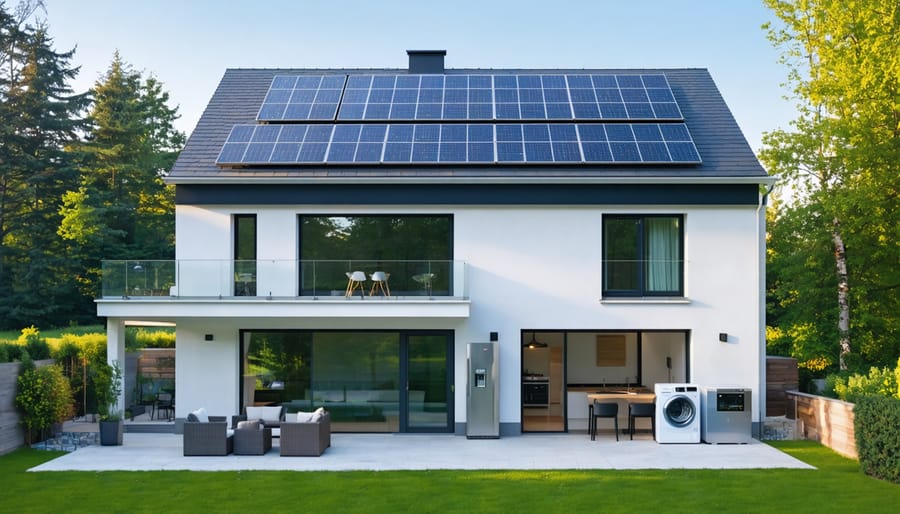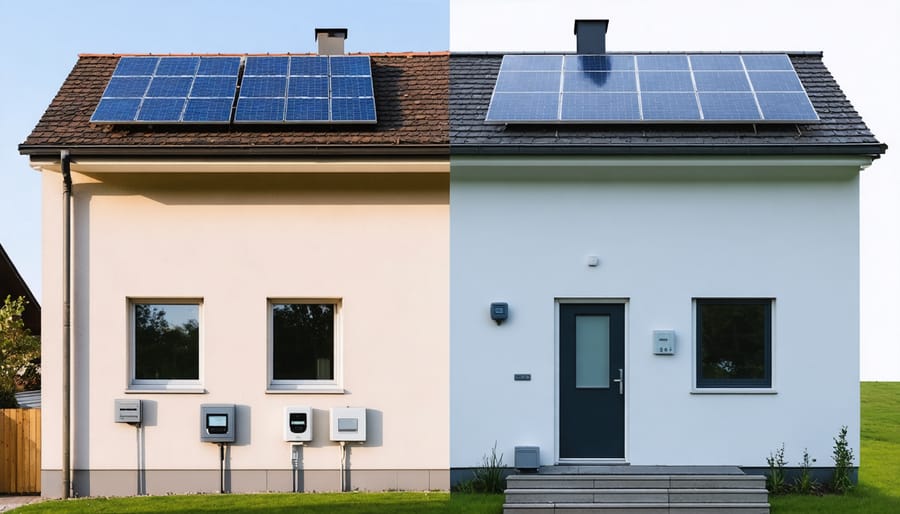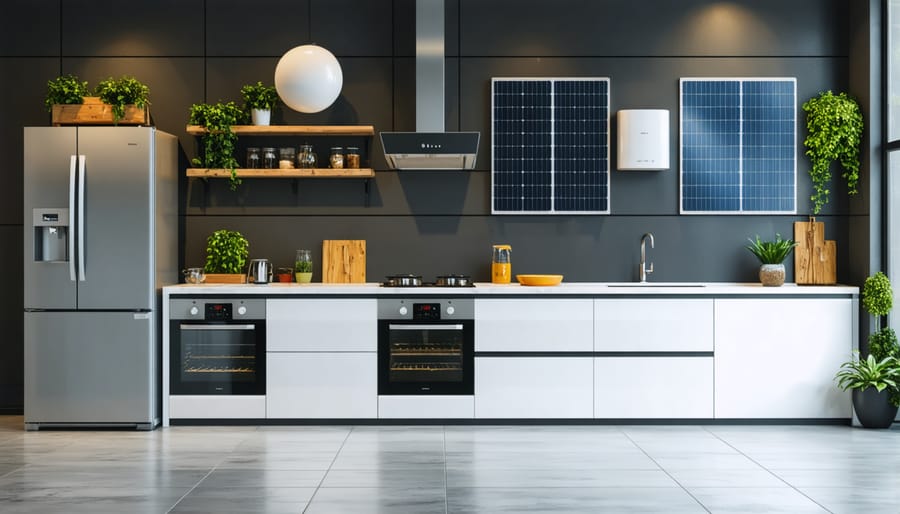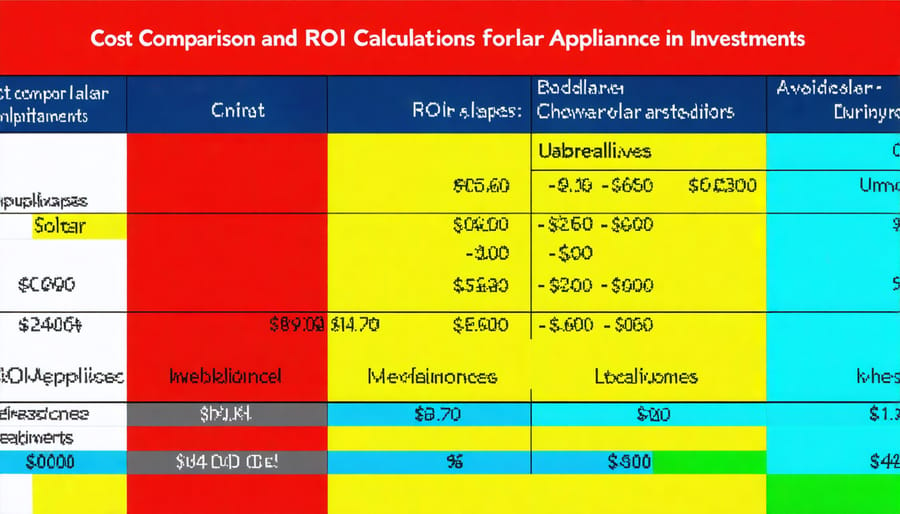Solar-Powered Appliances That Actually Save You Money (And Work in Europe)

Transform your home into an energy-independent sanctuary with solar-powered appliances – the innovative intersection of sustainable living and modern convenience. As Europe accelerates its transition to renewable energy, these smart devices harness the sun’s power to operate everything from refrigerators and washing machines to outdoor lighting and kitchen equipment, significantly reducing both carbon footprints and utility bills.
Solar-powered appliances represent more than just eco-friendly alternatives; they’re becoming essential components of resilient, future-proof homes across Europe. With advanced photovoltaic technology now enabling efficient operation even during cloudy days, these appliances offer practical solutions for both urban dwellers and rural homeowners. Recent studies show that households implementing solar-powered appliances can reduce their energy consumption by up to 70%, while maintaining the same level of convenience and functionality.
Whether you’re considering a complete solar-powered kitchen renovation or starting small with portable solar devices, today’s market offers unprecedented options for every budget and requirement. As European energy prices continue to rise and environmental regulations tighten, investing in solar-powered appliances isn’t just an ecological choice – it’s a smart financial decision that promises long-term returns while contributing to a sustainable future.
How Solar-Powered Home Appliances Transform Daily Living

Energy Independence Benefits
Solar-powered appliances offer a transformative path towards energy independence, enabling households and businesses to significantly reduce your power bills while decreasing reliance on traditional power grids. By harnessing solar energy directly, these appliances create a self-sustaining ecosystem within your property, providing reliable power even during grid outages or peak consumption periods.
The financial benefits are particularly compelling for European consumers, who typically face high electricity rates. Solar-powered appliances can lower monthly energy costs by 40-60%, with some systems paying for themselves within 3-5 years through accumulated savings. This independence also shields users from future energy price increases and market volatility.
Beyond immediate cost savings, energy independence through solar appliances offers valuable grid stability benefits for local communities. During peak demand periods, solar-powered systems reduce strain on the electrical infrastructure, contributing to a more resilient and sustainable energy network. This self-sufficiency also provides peace of mind during power outages, ensuring essential appliances remain operational when conventional power sources fail.
Environmental Impact
Solar-powered appliances significantly contribute to reducing household carbon footprints and promoting environmental sustainability. When compared to traditional grid-powered devices, these appliances can reduce CO2 emissions by up to 1.5 tonnes per household annually, depending on usage patterns and regional energy mix.
The environmental benefits extend beyond carbon reduction. By harnessing solar energy, these appliances decrease reliance on fossil fuels and help preserve natural resources. A typical solar-powered refrigerator, for instance, can prevent the emission of approximately 100kg of CO2 per year compared to its conventional counterpart.
In the European context, the widespread adoption of solar appliances aligns with the EU’s Green Deal objectives and supports the continent’s transition towards climate neutrality. Manufacturing processes for solar-powered appliances have also become more sustainable, with many European manufacturers implementing circular economy principles in their production lines.
Additionally, these appliances contribute to reduced grid strain during peak hours, particularly during summer months when cooling demands are highest. This decreased pressure on the power grid helps prevent the activation of fossil fuel-based backup power plants, further enhancing environmental benefits.
Most Efficient Solar-Powered Appliances for European Homes
Solar Water Heaters
Solar water heaters represent one of the most efficient and cost-effective solar-powered appliances available in the European market today. These systems typically achieve efficiency ratings between 70% and 80%, significantly reducing household energy consumption for water heating, which accounts for approximately 15% of home energy use.
Modern solar water heaters come in two primary variants: flat-plate collectors and evacuated tube systems. Flat-plate collectors, popular in Southern European regions, offer excellent performance during summer months and cost less initially. Evacuated tube systems, while more expensive, perform better in colder climates and cloudy conditions, making them ideal for Northern European installations.
The initial investment for a solar water heating system ranges from €3,000 to €7,000, depending on system size and type. However, most households recover these costs within 4-8 years through reduced energy bills, with annual savings typically ranging from €300 to €600. Many European countries offer incentives and subsidies, further improving the financial appeal.
Installation considerations include roof orientation (ideally south-facing), available space (4-6 square metres for an average household), and structural capacity. Professional installation is essential and should comply with local building regulations. The systems require minimal maintenance, typically an annual inspection, and can last 20-25 years with proper care.
For optimal performance in European climates, most installations include a backup heating system for cloudy days and winter months, ensuring consistent hot water supply year-round.
Solar-Powered Kitchen Appliances
The kitchen represents one of the most energy-intensive areas in any home, making it an ideal candidate for solar-powered innovations. Modern solar-powered kitchen appliances, when combined with efficient solar power storage solutions, offer sustainable alternatives to traditional electrical appliances.
Solar-powered refrigerators lead the innovation wave, utilizing direct solar energy or battery systems to maintain consistent cooling. These units are particularly efficient in European climates, operating effectively even during cloudy days through advanced thermal storage technology. Many models now feature smart monitoring systems that optimize energy consumption based on available sunlight and usage patterns.
Solar ovens and cookers have evolved significantly, offering practical solutions for both domestic and commercial kitchens. These appliances use concentrated solar energy to achieve cooking temperatures up to 200°C, making them suitable for various cooking methods. Modern designs incorporate hybrid systems that can seamlessly switch between solar and conventional power sources, ensuring uninterrupted cooking capability.
Smaller appliances like coffee makers, blenders, and food processors are increasingly available with solar compatibility. These appliances typically connect to home solar systems through specialized inverters, ensuring stable power supply while maintaining optimal performance. Many feature energy-efficient designs that maximize available solar power, making them particularly attractive for eco-conscious European households looking to reduce their carbon footprint.

Outdoor and Garden Solutions
Solar technology has revolutionised outdoor and garden solutions, offering efficient and sustainable alternatives for various applications. Solar-powered garden lights have become increasingly sophisticated, providing reliable illumination for pathways, security areas, and decorative features while operating completely off-grid. These lighting systems now include motion sensors and adjustable brightness settings, ensuring optimal energy usage throughout the year.
Automated irrigation systems powered by solar energy have transformed garden maintenance across Europe. These smart systems combine solar panels with efficient water management controllers, enabling precise watering schedules based on soil moisture levels and weather conditions. This technology not only conserves water but also ensures optimal plant growth while reducing energy costs.
For outdoor entertainment, solar-powered solutions have expanded beyond basic lighting. Modern solar-powered speakers, mobile device charging stations, and even outdoor kitchen appliances are now available, making sustainable outdoor living more accessible. These entertainment systems often include battery storage, ensuring continued operation during evening hours or less sunny days.
Professional-grade solar fountain pumps and water features have also gained popularity, operating silently while creating attractive focal points in gardens. These systems typically include filtered water circulation, helping maintain clear water without the need for grid electricity.
When selecting outdoor solar solutions, consider local climate conditions, positioning for optimal sun exposure, and seasonal variations in daylight hours. Many modern systems now include smart controls accessible via mobile applications, allowing users to monitor performance and adjust settings remotely.
Integration and Installation Considerations
Power Requirements and System Sizing
Determining the right power requirements for solar-powered appliances is crucial to maximize your home’s energy potential. Start by conducting a thorough energy audit of your intended appliances, noting their wattage and daily usage hours. Most household appliances display their power consumption in watts or kilowatts, which helps calculate your total daily energy needs.
For accurate system sizing, multiply each appliance’s wattage by its daily operating hours to determine watt-hours per day. Add a 20% buffer to account for system losses and future needs. Consider seasonal variations in solar exposure, particularly important in European climates where winter months receive significantly less sunlight.
A typical European household might require:
– Small system (2-3 kW): Suitable for basic appliances like lighting, refrigeration, and small electronics
– Medium system (4-6 kW): Supports additional appliances like washing machines and dishwashers
– Large system (7-10 kW): Powers most household appliances including heat pumps and electric vehicle charging
Factor in your roof’s available space and orientation, as these influence the system’s generation capacity. South-facing installations typically yield optimal results in European latitudes. Consider energy storage solutions if you plan to run appliances during non-sunlight hours. Modern battery systems can store excess daytime production for evening use, ensuring consistent power supply for your appliances.
Remember to consult with certified solar installers who can perform detailed site assessments and provide precise calculations based on your specific location and energy requirements.
Professional Installation vs DIY
The installation of solar-powered appliances presents two distinct paths: professional installation and do-it-yourself implementation. Professional installation offers numerous advantages, particularly for complex systems like solar refrigerators or integrated home solutions. Certified installers bring expertise in electrical systems, proper positioning, and compliance with European energy regulations, ensuring optimal performance and safety.
Professional installers conduct thorough site assessments, determining the best placement for solar panels and implementing appropriate safety measures. They also handle necessary permits and ensure installations meet local building codes and EU energy standards. This expertise often translates to higher system efficiency and longer equipment lifespan.
However, DIY installation can be suitable for smaller, standalone solar appliances like portable cookers or solar-powered ventilation fans. These typically come with plug-and-play designs and comprehensive instruction manuals. The DIY approach can reduce initial costs but requires careful attention to safety protocols and basic technical knowledge.
Safety considerations are paramount regardless of the chosen installation method. Solar systems involve electrical components and often require roof access or structural modifications. DIY installers must understand basic electrical principles, weather sealing techniques, and proper equipment handling. They should also be aware of warranty implications, as some manufacturers may void coverage for non-professional installations.
For most European homeowners, professional installation represents the safest and most efficient choice, particularly for systems integrated into the home’s electrical infrastructure. While the upfront costs may be higher, professional installation often provides long-term value through optimal system performance, proper documentation for insurance purposes, and comprehensive warranty coverage. Additionally, professional installers typically offer ongoing maintenance support and system monitoring services.
Investment and Returns
Initial Costs vs Long-term Savings
While current solar installation costs for appliances may seem substantial initially, ranging from €500 for small devices to €3,000 for larger systems, the long-term financial benefits often justify the investment. Most solar-powered appliances pay for themselves within 3-5 years through reduced electricity bills, with savings continuing for 20+ years of operational life.
For example, a solar water heater typically costs €2,000-2,500 but can reduce annual water heating expenses by 70-80%, resulting in approximately €300-400 yearly savings. Solar-powered refrigerators, while commanding a premium of €1,500-2,000 over conventional models, can reduce electricity consumption by up to 40%.
European homeowners can further offset initial costs through various EU and national incentives, including tax rebates and installation grants. Many regions offer subsidies covering 20-30% of the equipment cost. Additionally, the increasing efficiency of solar technology continues to drive down prices while improving performance, making the investment increasingly attractive for cost-conscious consumers focused on sustainable living.

Available European Incentives
The European Union and individual member states offer numerous incentives to promote the adoption of solar-powered appliances. Through the NextGenerationEU initiative, homeowners can access grants covering up to 40% of solar installation costs, including appliance integration. The Energy Efficiency Directive provides additional support through tax rebates and low-interest financing options.
Notable country-specific programs include Germany’s KfW grants, offering up to €6,000 for solar-powered heating systems and appliances. France’s MaPrimeRénov scheme provides tiered support based on household income, with maximum benefits of €4,000 for solar thermal installations. In Spain, the MOVES III program covers up to 45% of costs for solar-integrated appliance systems.
Many regions also offer supplementary incentives. For instance, the Netherlands’ ISDE subsidy supports heat pumps and solar water heaters, while Italy’s Superbonus initiative provides tax deductions up to 110% for comprehensive solar installations including appliances.
To access these incentives, homeowners typically need to work with certified installers and submit applications through designated government portals. Local energy agencies provide free consultation services to help navigate available options and maximize benefits.
The transition to solar-powered appliances represents a significant step towards sustainable living and energy independence. These innovative solutions offer compelling benefits: reduced electricity bills, decreased carbon footprint, and enhanced energy security for European households and businesses. By integrating solar appliances into our daily lives, we contribute to a cleaner environment while enjoying modern conveniences powered by renewable energy. The technology has matured significantly, making solar appliances more reliable and cost-effective than ever before. As European nations continue to prioritize sustainable development, now is the ideal time to explore solar-powered alternatives for your home or business. Take the first step by assessing your energy needs and consulting with solar specialists to determine the most suitable solutions for your specific requirements. The future of household energy is bright, sustainable, and powered by the sun.
Leave a Reply